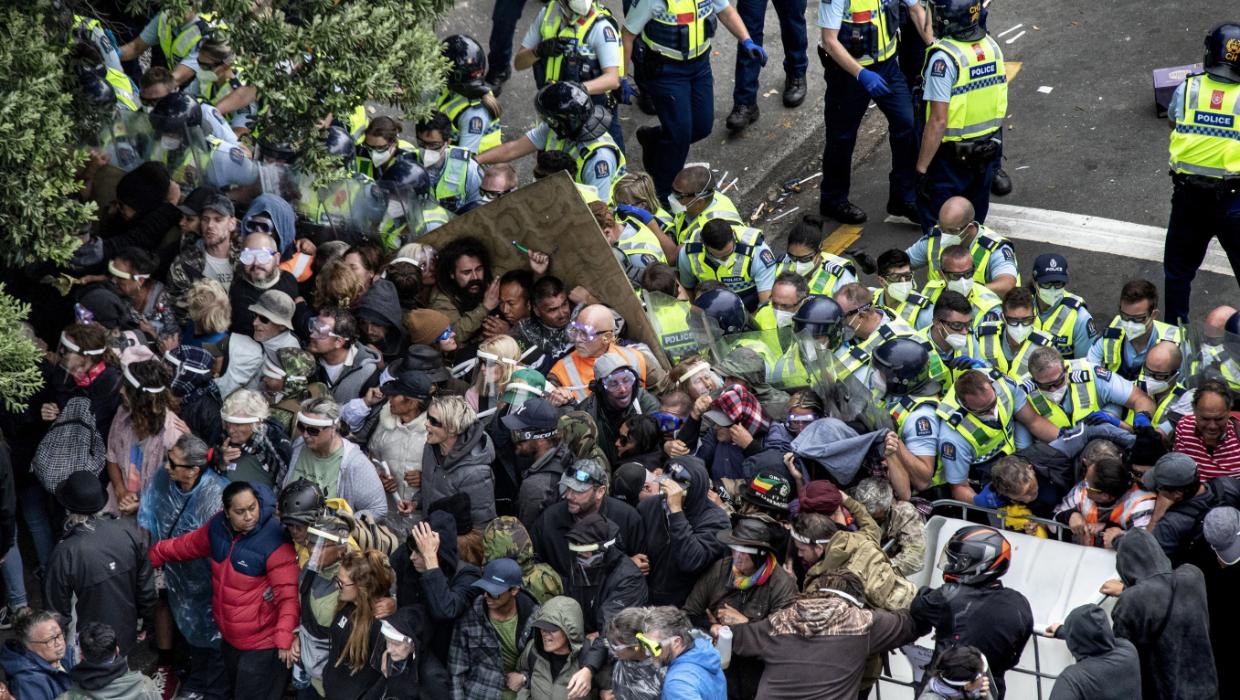Politics
Inside New Zealand’s Sovereign Citizens: A Unique Perspective

In New Zealand, a growing movement of individuals known as sovereign citizens challenges conventional views on authority and governance. Mike and Jenna, a couple from a typical Kiwi community, exemplify this philosophy, asserting that they are not dangerous but rather different in their beliefs. They live a seemingly ordinary life, marked by the daily chaos of raising their four children, yet their worldview diverges significantly from societal norms.
The couple, who prefer to remain anonymous, welcome visitors into their home with warmth but express a deep skepticism about conventional authority. “We’re really quite normal,” Mike states, adding that they may be “a bit too boring for your story.” Despite their friendly demeanor, they harbor mistrust towards journalists and government institutions alike. “Probably less,” Mike remarks about their level of trust in journalists compared to the government.
At the core of their beliefs lies the notion that laws are not absolute. According to Jenna, “We’re just living how we believe, and that doesn’t make us dangerous. Weird? Maybe. But not dangerous.” This perspective leads them to reject many civic obligations, such as registering their vehicles or paying taxes. They live by the idea that government operates as a service provider from which they can selectively choose which rules to accept.
Across New Zealand, this belief system is gaining traction. Although the number of individuals identifying as sovereign citizens remains relatively small, their actions have caused disruptions for local police, councils, and courts. For instance, Bradley and Michelle O’Donnell faced a hefty fine of $20,000 after undertaking home renovations without council approval, claiming to have received consent from an unofficial authority. Similarly, Graham Philip was found guilty of sabotaging a power grid during Covid-19 lockdowns, asserting he was defending his rights through unusual legal arguments.
Cases like these illustrate a broader trend identified by legal scholars such as Stephen Young from the University of Otago. He describes the phenomenon as “pseudo-law,” a concept where individuals reinterpret legal frameworks through a different narrative. Young notes that many adherents perceive the government as having either lost legitimacy or never having been legitimate in the first place.
The movement’s roots trace back to the United States in the 1990s, where early sovereign citizens declared themselves subjects of individual states rather than the federal government. Over time, these ideas have evolved and intertwined with various conspiracy theories, leading some to establish their own courts and appoint unofficial law enforcement.
Young highlights the practical appeal of these beliefs, particularly for individuals facing financial hardships. “They go online and find someone saying, ‘you don’t have to do this, even tax is voluntary,’” he explains. This environment fosters a sense of community among those who feel marginalized by traditional institutions. He warns, however, of the potential for these beliefs to escalate into more serious confrontations, as seen in Australia.
In a stark reminder of the risks involved, Young points to the case of Dezi Freeman in Victoria, Australia, who became a fugitive after allegedly killing two police officers. Such incidents raise concerns about the implications of normalizing these beliefs.
Mike and Jenna, while acknowledging their unconventional views, firmly reject any notion that they have been radicalized. Mike reflects on his long-standing questioning of societal norms. “I never signed up for a lot of it,” he recalls, describing his childhood curiosity about rules and societal expectations. As an adult, he gradually chose to reject certain obligations he deemed nonsensical.
The couple’s perspective gained momentum during the Covid-19 pandemic, which they believe demonstrated government overreach. Mask mandates and vaccine requirements served to reinforce their conviction that resistance was necessary. Their opposition to vaccination and government mandates illustrates their commitment to their beliefs.
While many individuals within this movement share similar experiences of estrangement from family and friends, Mike and Jenna maintain that they do not aim to incite harm or violence. They simply wish to live according to their convictions, asserting their right to question authority. Jenna concludes, “We’re just saying no, we don’t consent.”
As they navigate daily life, Mike and Jenna embody the complexities of this movement. They engage in typical parental duties while holding firm to their beliefs. Their home life, filled with the delightful chaos of children, contrasts sharply with their philosophical stance on citizenship and governance.
The ongoing discussions surrounding sovereign citizenship reflect deeper societal issues, including distrust in government and the perceived inequalities faced by individuals lacking resources. While the impact of these beliefs in New Zealand has thus far been primarily bureaucratic, legal experts caution against complacency, suggesting that failure to address these ideas could lead to serious consequences in the future.
-

 World4 months ago
World4 months agoTest Your Knowledge: Take the Herald’s Afternoon Quiz Today
-

 Sports4 months ago
Sports4 months agoPM Faces Backlash from Fans During Netball Trophy Ceremony
-

 Lifestyle4 months ago
Lifestyle4 months agoDunedin Designers Win Top Award at Hokonui Fashion Event
-

 Entertainment5 months ago
Entertainment5 months agoExperience the Excitement of ‘Chief of War’ in Oʻahu
-

 Sports4 months ago
Sports4 months agoLiam Lawson Launches New Era for Racing Bulls with Strong Start
-

 World5 months ago
World5 months agoCoalition Forms to Preserve Māori Wards in Hawke’s Bay
-

 Health4 months ago
Health4 months agoWalking Faster Offers Major Health Benefits for Older Adults
-

 Lifestyle4 months ago
Lifestyle4 months agoDisney Fan Reveals Dress Code Tips for Park Visitors
-

 Politics4 months ago
Politics4 months agoScots Rally with Humor and Music to Protest Trump’s Visit
-

 Top Stories5 months ago
Top Stories5 months agoUK and India Finalize Trade Deal to Boost Economic Ties
-

 Health2 months ago
Health2 months agoRadio Host Jay-Jay Feeney’s Partner Secures Visa to Stay in NZ
-

 World5 months ago
World5 months agoHuntly Begins Water Pipe Flushing to Resolve Brown Water Issue









